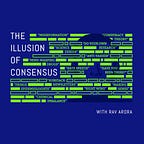Hi Illusion of Consensus readers,
I am delighted to host Kelly Krohnert, who has come to prominence during the pandemic as basically a citizen scientist, a leader in holding the CDC and other scientists accountable for basic errors in math and counting. It's been striking to watch professionals publish pieces — scare-mongering about the deadliness of COVID to children — and to watch Kelly take apart these claims, using data from the CDC, analyzing the basic standard sources.
I've been admiring her advocacy for some time now on Twitter. In fact, I think I wrote a tweet saying that you're a national treasure, and I honestly believe that. It's been wonderful to watch. Enjoy my hour-long conversation with her.
— Jay Bhattacharya
Spotify:
Apple podcasts:
Kelley on a striking example of the inflation of Covid risk in children:
Supreme Court Justice Sotomayor said a 100,000 hospitalized children. And she was like, many of them severe. And the number was actually like 4,500 children in the hospital with a positive COVID diagnosis and no indication of severity. I mean, we know in fact that a percentage of those weren't there for COVID at all. They were there for broken bones or, you know, other treatments or things that kids might be hospitalized for.
I never could figure out where that number came from. Like I said, usually it's kind of satisfying to say, okay, I see where they got that from. In this case it just seemed like some kind of folklore, almost like she just had came up with it.
Jay responds: I mean, I can forgive rounding when you're doing public communication. So like something where you're saying informally in the context of a podcast, even, or you say about a thousand, something like that, right? Because who cares if it's 9.99 or a thousand and one. But like the Supreme court justice talking on that, that's not rounding.
Kelley explains the manipulation of Covid death figures
It's kind of a strange thing to understand, but I was familiar enough with the numbers that I was like, I see what they're doing here. I know where these multiple causes of death just means COVID is listed anywhere on the death certificate. Normally the death certificate will list a series of events that cause your death. So, you know, maybe you got sick with something and then that led to, you know, respiratory issue or, you know, heart attack or whatever. And it goes from there. But that whatever caused that initial thing, that would be your underlying cause of death, whether it was a car accident or cancer or an illness or whatever else. And so that's the underlying cause is basically what started the chain of events that led to the death. And then there's the things that follow it. And there's also a section called contributing factors. So anything else like, oh, well, the person was a smoker. Oh, well, the person was obese or oh, the person had you know, congestive heart failure, whatever else that might've just been another ongoing condition with the person.
So if COVID is listed in that contributing factor, it's considered a multiple cause of death, but you know, if you were in a car accident, and this happened, I mean, in Georgia, I know there was someone who was killed in a car accident, but they said they also had COVID and that complicated their recovery from the massive car accident. And so that counts as a COVID death from multiple cause. But mostly people think underlying cause of like a person got COVID and then suddenly it progressed from there and it got worse. And that would be COVID as the underlying cause of death. So the underlying cause is a smaller number.
Kelley explains her recent paper on the CDC’s errors co-authored by Dr. Tracy Beth Hoeg and Dr. Vinay Prasad:
So basically, I mean, when we were putting the paper together, a lot of it was just a compilation of things we had kind of found along the way. And that either things that, again, either I uncovered or things people had sent me that I was involved in kind of tracking down or things others of us had come across and noted.
There was just kind of a long list. There's about 25 items that were just, the number was this and they said it was this. Some of them were just basic calculation errors. Some of them were probably more like data tabulation problems, but there was no error checking to catch so that these things went out. Or the data tracker where they track the pediatric deaths in two different places via two different methods. And one of the methods seems to have a problem.
It grossly overstates pediatric deaths, specifically for certain age groups of children. And they basically never really had an answer on that. They did make a correction at one point, and that was actually written up, there was an article in the BMJ about it, where they had corrected child deaths. And I think they ended up actually adding a lot of them back at some point, because I don't think they're... there's some problems still with how those numbers are tabulated, because they don't match the actual data that the CDC has in Wonder. And I mean, they've said very clearly in multiple media inquiries, like the data in Wonder or the NCHS data, that's the official data versus the data tracker is just this other little surveillance kind of demographic information. I'm like, just take it down.









